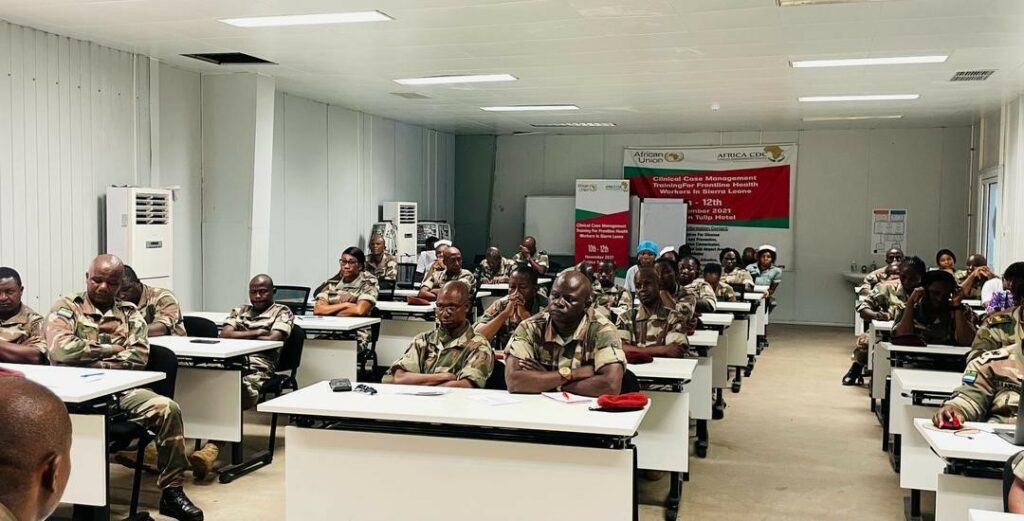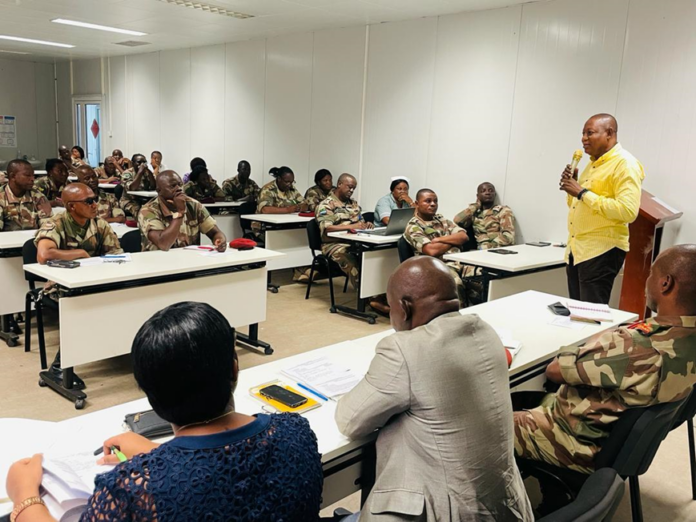In its effort to combat corruption, the Anti-Corruption Commission (ACC) in recent times has made strides in engaging Ministries, Departments and Agencies (MDAs as well as market women and the like about the dangers of corruption and the need to combat it in the country.
One of the recent strides by the ACC is their engagement with staff of 34 Military Hospital at Wilberforce, where the Commission through its Public Relations Unit explained corruption risk in service delivery within MDAs. A detailed account of the engagement is reported by Yangie D. Sesay, Public Education Officer:
“It is important to identify corruption risks and issues in order to detect and strengthen institutional strategies aimed at preventing corrupt conduct.” This is according to the Joint Medical Unit Commander of the Republic of Sierra Leone Armed Forces (RSLAF) Colonel Dr. Stephen Sevalie, who made the remarks during an interactive meeting on Wednesday, 21st February 2024, at the Disease Prevention Control Center, Wilberforce, in Freetown. The meeting was facilitated by the Anti-Corruption Commission’s (ACC) Public Education Unit.
Colonel Dr Sevalie stated that although this is ACC’s first interaction with the hospital staff, they were happy to have the team, fully aware that the engagement is for the benefit of the staff.
According to Michael Sesay, Head of the ACC’s Public Education Unit, he stated that corruption still affects vulnerable and marginalized groups in the health sector, depriving them of their right to adequate healthcare. He went on to say that there are serious implications for reaching universal health coverage if health services are not accessible, high-quality, efficient, and effective. This is why, according to him, the Commission has focused on educating employees on the do’s and don’ts of corruption within Ministries, Departments, and Agencies. He came to the conclusion that putting strong anti-corruption measures in place is essential to accomplishing programs meant to enhance everyone’s quality of life.
“A journey of a thousand mile is determined by the conduct of an hour,” Head of the Policy and Ethics Unit at the ACC, Musa Kanteh, started off with his remarks. According to him, this quotation ought to act as a warning that every dishonest act or blunder can damage one’s hard-earned reputation, emphasizing that corruption enters a person’s life via treat and temptation. He cautioned the 34 Military staff to exercise caution when accepting gifts, pointing out that some are meant for a corrupt purpose. He counselled them to base their decisions on the law, regulations, guidelines and best practices.
“Moral values, codes of conduct and ethical transparency are important forces in the fight against corruption,” Mr Kanteh noted. He cautioned the staff and management to quickly establish the necessary frameworks, such as creating a gift register, setting up Integrity Management Committees (IMC), and a Service Charter. He mentioned that this has been implemented in many MDAs and has assisted in preventing corruption, which will ultimately result in the public receiving high-quality health services.
Assistant Prosecutor, ACC, Georgina C.M. Vincent, reminded management and staff of the hospital during her presentation that the Anti-Corruption Act of 2008, as amended in 2019, has stiff fines and offences that were purposefully designed to discourage corruption and lower its incidences. She also reminded them of their legal obligation to abide by the Act’s provisions, stressing that breaking the law is never an acceptable justification.
She also brought up the changes made to some sections of the Anti-Corruption Act 2008 in 2019, pointing out the one that calls for severe penalties and fines as well as the recovery of money that has been embezzled. She encouraged the medical staff to carry out their responsibilities within the bounds of the law and abstain from any act that could lead to an ACC investigation.
ACC’s Public Education Officer, Yangie D. Sesay, acknowledged that combating corruption should be viewed as a civic duty shared by all citizens rather than just the ACC’s domain. In light of some of the rules in the health code of ethics, she challenged them to put the anti-corruption principles they had learned into practice. She also urged them to respect the words of the National Pledge, take pride in acting morally, and to call out the dishonest. Miss Sesay shared with them the various means of reporting corruption to the Commission, while at the same time assuring them of confidentiality.

The staff of 34 Military Hospital listening to Integrity messages.


